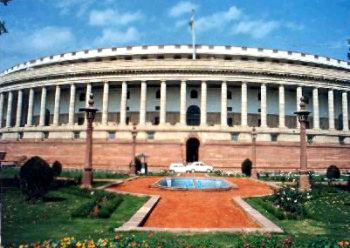 Functions of Indian Speaker are multifarious. In India, through the Constitution of the land, through the Rules of Procedure and Conduct of Business in Lok Sabha and through the practices and conventions, adequate powers are vested in the office of the Speaker to help in the smooth conduct of the parliamentary proceedings and for protecting the independence and impartiality of the office. The various functions of the Indian speaker are discussed below.
Functions of Indian Speaker are multifarious. In India, through the Constitution of the land, through the Rules of Procedure and Conduct of Business in Lok Sabha and through the practices and conventions, adequate powers are vested in the office of the Speaker to help in the smooth conduct of the parliamentary proceedings and for protecting the independence and impartiality of the office. The various functions of the Indian speaker are discussed below.
Responsibility for regulating the procedure of the house rests with the Speaker. It is the Presiding Officer who decides the admissibility of a Question and the forms in which amendments may be moved from the Motion of Thanks to the President`s Address. With regard to moving amendments to a Bill, the permission of the Chair is required. If a Bill is pending before the House, it is the Speaker who decides whether amendments to be moved to various clauses of the Bill are to be allowed or not. As regards regulating discussions in the House, it is the Speaker who decides as to when a member shall speak and how long she shall speak. A member who flouts her orders or directions may be named by the Speaker and in such cases, may have to withdraw from the House.
The Speaker is the guardian of the rights and privileges of the House, its Committees and members. It depends solely on the Speaker to refer any question of privilege to the Committee of Privileges for examination, investigation and report. The decisions of the House are communicated to outside individuals and authorities through the Speaker. It is the Speaker who decides the form and manner in which the proceedings of the House is published. Warrants to execute the orders of the House are issued by the Speaker and, wherever necessary, reprimands on behalf of the House are also delivered by the Speaker.
The entire Parliamentary Estate is under the authority of the Speaker.
The Speaker also has certain residuary powers under the Rules of Procedure. All matters which are not specifically provided under the rules and all questions relating to the working of the rules are regulated by the Speaker. In exercise of this power and under his/her inherent powers, the Speaker issues from time to time directions which are generally treated as sacrosanct as the Rules of Procedure. On matters regarding interpretation of constitutional provisions relating to the House or the Rules of Procedure, Speaker often gives rulings which are respected by members and are binding in nature.
Under the Constitution of India, the Speaker enjoys a special position insofar as certain matters pertaining to the relations between the two Houses of Parliament are concerned. He/she certifies Money Bills. It is the Speaker of the Lok Sabha who presides over joint sittings called in the event of disagreement between the two Houses on a legislative measure. The Speaker lays down the necessary guidelines for recognition of parliamentary parties.
The Speaker decides on granting recognition to the Leader of the Opposition in the Lok Sabha. Following the 52nd Constitution amendment, the Speaker is vested with the power relating to the disqualification of a member of the Lok Sabha on grounds of defection. The Speaker makes obituary references in the House, formal references to important national and international events and the valedictory address at the conclusion of every Session of the Lok Sabha and also when the term of the House expires.
The Committees of the House function under the overall direction of the Speaker. Committees like the Business Advisory Committee, the General Purposes Committee and the Rules Committee work directly under her Chairmanship.
Speaker and Members
The Speaker is at once a member of the House as also its Presiding Officer. It is always the Speaker`s task to ensure that parliamentary decorum is maintained under all circumstances. For this she is invested with wide-ranging disciplinary powers under the rules. The Speaker also keeps open a variety of informal channels of communication with individual members and the Leaders of Parties and Groups in the Lok Sabha.
Speaker and Inter-Parliamentary Relations
The Speaker has certain other functions to perform as the head of the Lok Sabha. He/she is the ex officio President of the Indian Parliamentary Group (IPG), set up in 1949, which functions as the National Group of the Inter-Parliamentary Union (IPU) and the Main Branch of the Commonwealth Parliamentary Association (CPA). In that capacity, members of various Indian Parliamentary Delegations going abroad are nominated by the Speaker after consulting the Chairman of the Rajya Sabha. Most often, the Speaker leads such Delegations. Besides, Speaker is the Chairman of the Conference of Presiding Officers of Legislative Bodies in India.
The Speaker is the head of the Lok Sabha Secretariat and it functions under the ultimate control and direction of the Speaker.




















